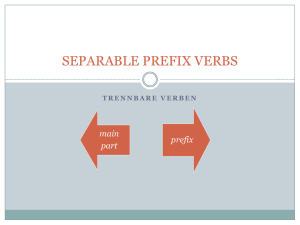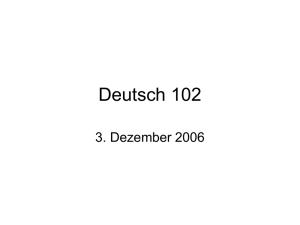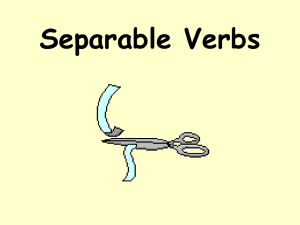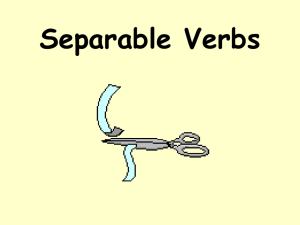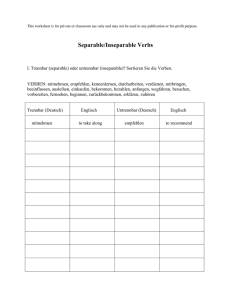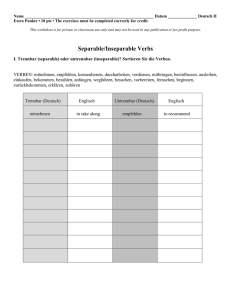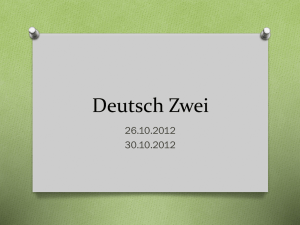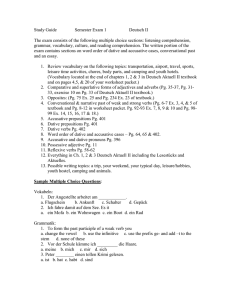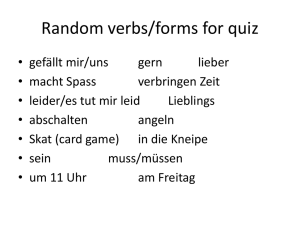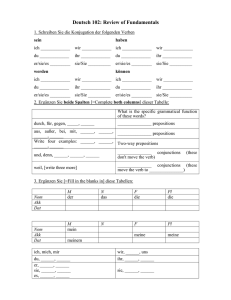Dative personal pronouns The following table lists the dative
Werbung
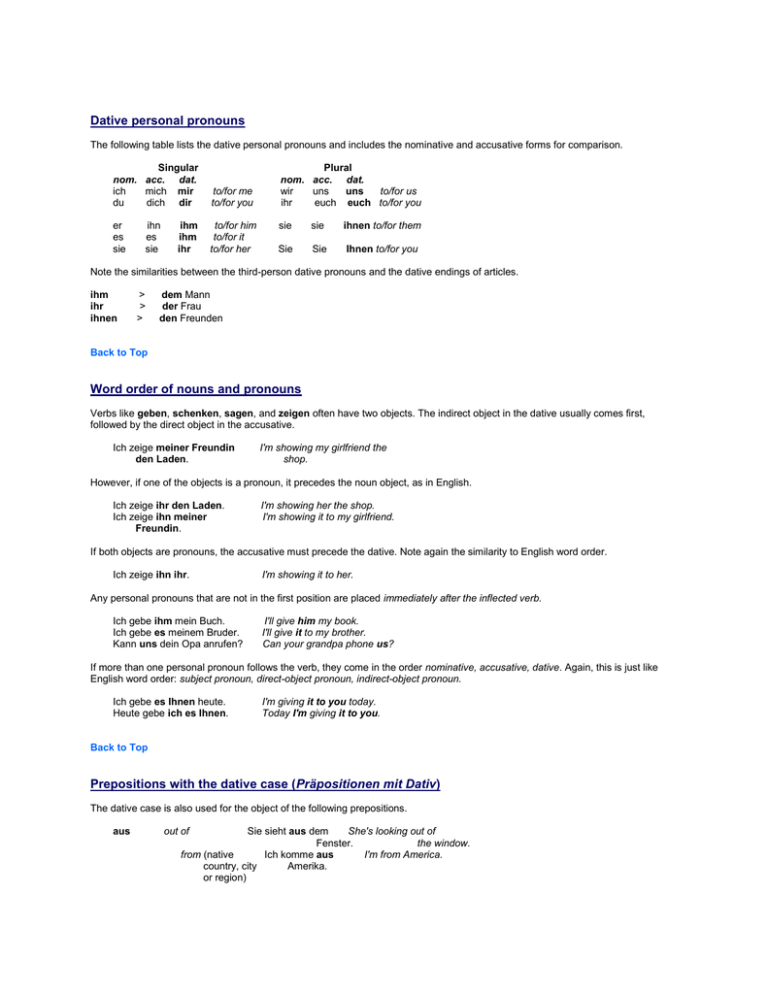
Dative personal pronouns The following table lists the dative personal pronouns and includes the nominative and accusative forms for comparison. Singular nom. acc. dat. ich mich mir du dich dir to/for me to/for you er es sie to/for him to/for it to/for her ihn es sie ihm ihm ihr Plural nom. acc. dat. wir uns uns to/for us ihr euch euch to/for you sie sie ihnen to/for them Sie Sie Ihnen to/for you Note the similarities between the third-person dative pronouns and the dative endings of articles. ihm ihr ihnen > > > dem Mann der Frau den Freunden Back to Top Word order of nouns and pronouns Verbs like geben, schenken, sagen, and zeigen often have two objects. The indirect object in the dative usually comes first, followed by the direct object in the accusative. Ich zeige meiner Freundin den Laden. I'm showing my girlfriend the shop. However, if one of the objects is a pronoun, it precedes the noun object, as in English. Ich zeige ihr den Laden. Ich zeige ihn meiner Freundin. I'm showing her the shop. I'm showing it to my girlfriend. If both objects are pronouns, the accusative must precede the dative. Note again the similarity to English word order. Ich zeige ihn ihr. I'm showing it to her. Any personal pronouns that are not in the first position are placed immediately after the inflected verb. Ich gebe ihm mein Buch. Ich gebe es meinem Bruder. Kann uns dein Opa anrufen? I'll give him my book. I'll give it to my brother. Can your grandpa phone us? If more than one personal pronoun follows the verb, they come in the order nominative, accusative, dative. Again, this is just like English word order: subject pronoun, direct-object pronoun, indirect-object pronoun. Ich gebe es Ihnen heute. Heute gebe ich es Ihnen. I'm giving it to you today. Today I'm giving it to you. Back to Top Prepositions with the dative case (Präpositionen mit Dativ) The dative case is also used for the object of the following prepositions. aus out of Sie sieht aus dem She's looking out of Fenster. the window. from (native Ich komme aus I'm from America. country, city Amerika. or region) außer except for Außer ihm sind We're all here except wir alle hier. for him. besides, in Außer ihm wohnt Besides him, his addition to auch sein brother lives here Bruder hier. too. bei in the home of Ich wohne bei I live at my aunt's. meiner Tante. Er ist bei der He's at work. Arbeit. at mit with Ich arbeite mit I work with my den Händen. hands. nach after seit since (referring to time) Seit dem Tag Since that day I mag ich ihn haven't liked nicht mehr. him. von from Das Buch habe Nach der Arbeit After work I'm bin ich manchsometimes tired. mal müde. to (with country Wir fahren nach We're going to and city England. England. names) I got that book from ich von meiner my mother. Mutter. Er ist ein Freund He's a friend of von mir. mine. Das ist ein Buch That's a book by von Hermann Hermann Hesse. Hesse. of by zu to (people and Ich gehe zur I'm going to school some locations) Schule und and then to my dann zu meinen friends' house. Freunden. Contractions The following contractions are standard. bei dem von dem zu dem zu der > > > > beim vom zum zur Brezeln kaufe ich immer beim Bäcker. Ich komme gerade vom Chef. Ich muss schnell zum Professor. Ich gehe jetzt zur Schule. Back to Top Verbs with separable prefixes The meanings of many English verbs can be changed or modified by the addition of another word. to find to look to burn to hang > > > > to find out to look up to burn down to hang around Likewise, the meanings of many German verbs are modified—or even changed completely—by the addition of a prefix to the root verb. stehen kommen hören fangen Similarly: to stand to come to hear to catch > > > > aufstehen to stand up; get out of bed mitkommen to come along aufhören to cease, stop anfangen to begin ankommen anrufen aufmachen kennen lernen zurückkommen to arrive to call up to open to get to know, meet to come back Verbs with such prefixes have the primary stress on the prefix (ankommen, aufhören). In the present tense and the imperative, the prefix is separated from the verb and placed at the end of the sentence or clause. It is the second part of the predicate. Ich stehe morgen sehr früh auf. Wann stehst du auf? Stehen Sie bitte auf! Steht ihr denn bald auf? I'm getting up very early tomorrow. When are you getting up? Please get up! Are you getting up soon? When a verb with a separable prefix complements a modal verb, the separable prefix is again attached to the root verb infinitive at the end of the sentence or clause. Without a modal Er fängt morgen an. Sie kommt bald zurück. With a modal Er soll morgen anfangen. Sie möchte bald zurückkommen. Note: Separable prefixes will be indicated in the Wortschatz sections by a raised dot between prefix and root verb: an·fangen. This symbol is used in this textbook, but not in conventional German spelling. Back to Top Verbs with inseparable prefixes There are also German verbs with inseparable prefixes. These prefixes never separate from the root verb. You can tell them from separable prefixes in these ways: They are never stressed. They have no independent meaning of their own, while separable prefixes resemble other parts of speech such as prepositions (mitkommen) and adverbs (zurückkommen). The inseparable prefixes are: be-, emp-, ent-, er-, ge-, ver-, and zer-. Here are the verbs with inseparable prefixes that you have already learned: bedeuten, beginnen, bekommen, beschreiben, besitzen, besprechen, besuchen, entscheiden, verdienen, verlassen, verstehen.
